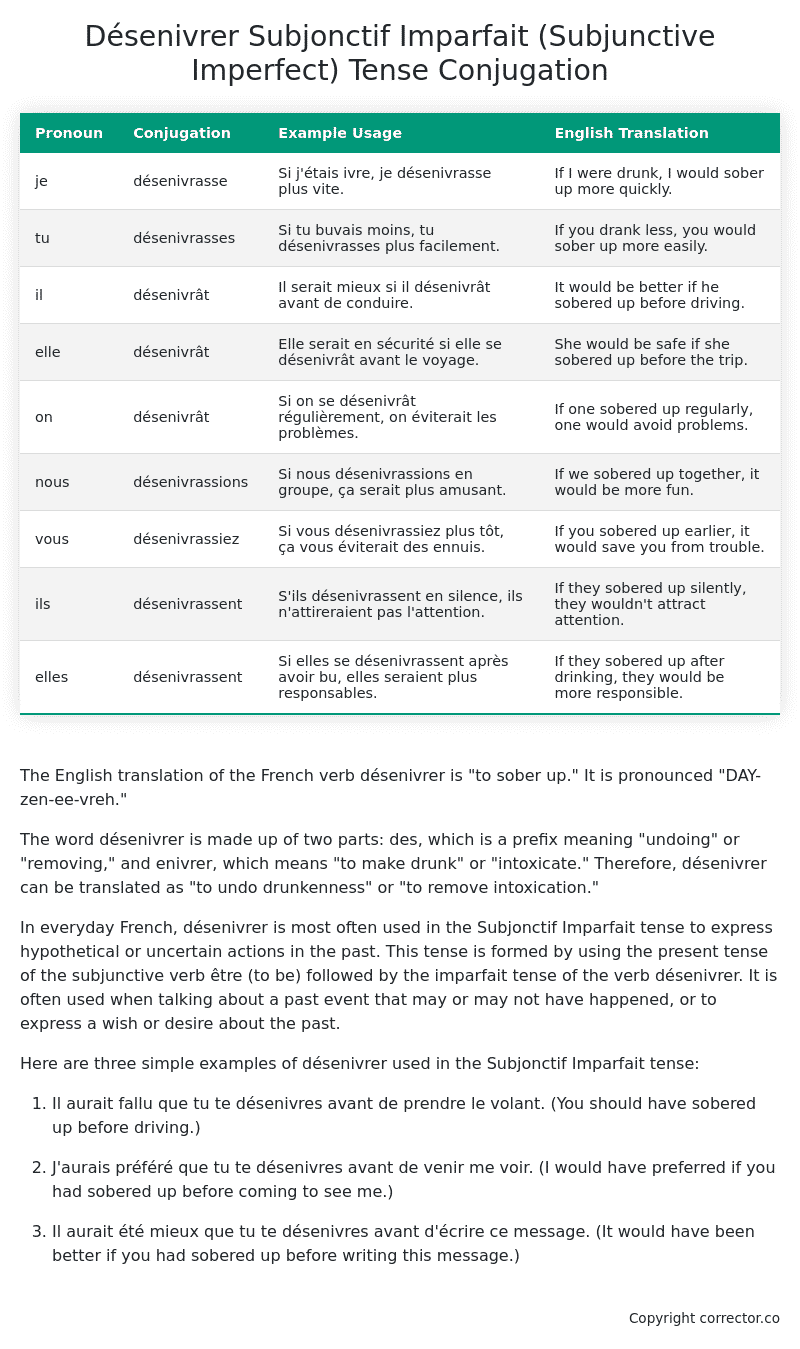Subjonctif Imparfait (Subjunctive Imperfect) Tense Conjugation of the French Verb désenivrer
Introduction to the verb désenivrer
The English translation of the French verb désenivrer is “to sober up.” It is pronounced “DAY-zen-ee-vreh.”
The word désenivrer is made up of two parts: des, which is a prefix meaning “undoing” or “removing,” and enivrer, which means “to make drunk” or “intoxicate.” Therefore, désenivrer can be translated as “to undo drunkenness” or “to remove intoxication.”
In everyday French, désenivrer is most often used in the Subjonctif Imparfait tense to express hypothetical or uncertain actions in the past. This tense is formed by using the present tense of the subjunctive verb être (to be) followed by the imparfait tense of the verb désenivrer. It is often used when talking about a past event that may or may not have happened, or to express a wish or desire about the past.
Here are three simple examples of désenivrer used in the Subjonctif Imparfait tense:
-
Il aurait fallu que tu te désenivres avant de prendre le volant. (You should have sobered up before driving.)
-
J’aurais préféré que tu te désenivres avant de venir me voir. (I would have preferred if you had sobered up before coming to see me.)
-
Il aurait été mieux que tu te désenivres avant d’écrire ce message. (It would have been better if you had sobered up before writing this message.)
Table of the Subjonctif Imparfait (Subjunctive Imperfect) Tense Conjugation of désenivrer
| Pronoun | Conjugation | Example Usage | English Translation |
|---|---|---|---|
| je | désenivrasse | Si j’étais ivre, je désenivrasse plus vite. | If I were drunk, I would sober up more quickly. |
| tu | désenivrasses | Si tu buvais moins, tu désenivrasses plus facilement. | If you drank less, you would sober up more easily. |
| il | désenivrât | Il serait mieux si il désenivrât avant de conduire. | It would be better if he sobered up before driving. |
| elle | désenivrât | Elle serait en sécurité si elle se désenivrât avant le voyage. | She would be safe if she sobered up before the trip. |
| on | désenivrât | Si on se désenivrât régulièrement, on éviterait les problèmes. | If one sobered up regularly, one would avoid problems. |
| nous | désenivrassions | Si nous désenivrassions en groupe, ça serait plus amusant. | If we sobered up together, it would be more fun. |
| vous | désenivrassiez | Si vous désenivrassiez plus tôt, ça vous éviterait des ennuis. | If you sobered up earlier, it would save you from trouble. |
| ils | désenivrassent | S’ils désenivrassent en silence, ils n’attireraient pas l’attention. | If they sobered up silently, they wouldn’t attract attention. |
| elles | désenivrassent | Si elles se désenivrassent après avoir bu, elles seraient plus responsables. | If they sobered up after drinking, they would be more responsible. |
Other Conjugations for Désenivrer.
Le Present (Present Tense) Conjugation of the French Verb désenivrer
Imparfait (Imperfect) Tense Conjugation of the French Verb désenivrer
Passé Simple (Simple Past) Tense Conjugation of the French Verb désenivrer
Passé Composé (Present Perfect) Tense Conjugation of the French Verb désenivrer
Futur Simple (Simple Future) Tense Conjugation of the French Verb désenivrer
Futur Proche (Near Future) Tense Conjugation of the French Verb désenivrer
Plus-que-parfait (Pluperfect) Tense Conjugation of the French Verb désenivrer
Passé Antérieur (Past Anterior) Tense Conjugation of the French Verb désenivrer
Futur Antérieur (Future Anterior) Tense Conjugation of the French Verb désenivrer
Subjonctif Présent (Subjunctive Present) Tense Conjugation of the French Verb désenivrer
Subjonctif Passé (Subjunctive Past) Tense Conjugation of the French Verb désenivrer
Subjonctif Imparfait (Subjunctive Imperfect) Tense Conjugation of the French Verb désenivrer (this article)
Subjonctif Plus-que-parfait (Subjunctive Pluperfect) Tense Conjugation of the French Verb désenivrer
Conditionnel Présent (Conditional Present) Tense Conjugation of the French Verb désenivrer
Conditionnel Passé (Conditional Past) Tense Conjugation of the French Verb désenivrer
L’impératif Présent (Imperative Present) Tense Conjugation of the French Verb désenivrer
L’infinitif Présent (Infinitive Present) Tense Conjugation of the French Verb désenivrer
Struggling with French verbs or the language in general? Why not use our free French Grammar Checker – no registration required!
Get a FREE Download Study Sheet of this Conjugation 🔥
Simply right click the image below, click “save image” and get your free reference for the désenivrer Subjonctif Imparfait tense conjugation!

Désenivrer – About the French Subjonctif Imparfait (Subjunctive Imperfect) Tense
Formation
Common Everyday Usage Patterns
Interactions with Other Tenses
Subjonctif Présent
Indicatif Passé Composé
Conditional
Conditional Perfect
Summary
I hope you enjoyed this article on the verb désenivrer. Still in a learning mood? Check out another TOTALLY random French verb conjugation!


